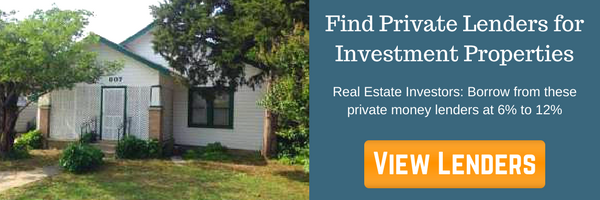
Private Lending Process: 6 Things You Should Know
Navigating through the private money lending process can be tricky. It’s very important for you to understand and remain mindful of the private money lender’s position.
As you describe to the potential lender the value of your property, how much you need to borrow, use of the funds, and description of the property; imagine the picture you’re painting in the mind of the lender.
We outlined some steps below—follow them and ensure a smooth process between you and the lender! For more information, continue reading…
Understand Who You’re Working With
Private money lenders are non-institutional lenders and are good for short-term as well as long-term term investment projects.
They are sometimes called relationship-based lenders and may consist of friends, family, professional or personal acquaintances. They may also be accredited investors with established private lending companies.
Accredited investors can be more reliable and have standardized fees, rates, and turns. These lenders have fewer regulations which can be beneficial to borrowers.
Accredited or not, you’re working with an individual—not an institution, and this is the most distinguished difference when utilizing private money. Understanding who you’re working with can take time, as you *actually* get to know the lender, what they’re looking for, and if you are a good fit together.
Realize That There are Disadvantages
The disadvantages to using a private money lender can be shorter repayment periods, varying interest rates, and varying fees.
While private lenders often have lower interest rates and more flexible terms, some will still be stringent with newer investors, or people they don’t know well.
Qualification requirements can be less stringent than institutional lenders which require higher credit scores along with lengthy investment history. Interest rates will be higher to start out but can decrease as the relationship develops.
Approval and Best Fit
The approval process can be as short as a few minutes and with a private money lender you can finance the purchase and renovation together in a single loan.
Approval from the private money lender may be as quick as a few minutes for prequalification or in 10-15 days for funding.
Private lenders are good for investors needing quick financing and investors who don’t qualify for conventional funding. Private lenders can be used to fund single-family and multi-family properties. Private lenders are also the best financing option for purchase of foreclosures, short sales, and nondistressed real estate owned properties, which typically move quickly.

Qualification Requirements
Prequalification usually requires at least a 550 credit score, 2 to 3 months of bank statements, and intended purchase price along with a property description.
That said, again, each individual is different and there are no standard terms for private lenders.
Upon securing the purchase agreement the borrower will be required to provide the lender with a copy of the contract, stipulating price and terms of sale, in order to finalize the funding for the purchase.
What the Private Money Lender Will Expect From You
Private money lenders typically loan 90% of the loan to value (LTV) ratio or 80% of the after rehab value (ARV).
The LTV is based on a percentage of the initial purchase price and the ARV is based on the fair market value of the property following renovation. Private money lenders commonly issue loans based on LTV for properties in good condition or loans based on ARV for properties and conditions needing repair.
Sharing the Risk
Requiring the borrower to assume some of the risk, private money lenders expect borrowers to invest 10% or more of the properties LTV or 20% or more of the ARV.
Interest rates can be as much as 13%, with appraisals usually costing between $300 and $400.
Private money lenders expect borrowers to cover all costs associated with the purchase, including closing costs and appraisals.
Because monthly payments are not amortized like conventional loans, the interest rate may be higher but the monthly payment may be lower. Lending fees, known as points, are structured to be higher for smaller amounts and decrease as the loan amount gets larger. One benefit to working with private lenders is that many will not charge any points, and if they do, this is sometimes negotiable.
A typical structure may show 2.5 points for loans $100,000-$250,000, 2 points for loans $250,000-$475,000, and 1.5 points for loans $475,000 or more.
Conclusion
Private Money Lending is the most sought after way to finance, but keep in mind that there are positives and negatives as with any relationship.
Make sure that you enter the process with solid knowledge of what you’re getting into, by doing your research. Expect to share the risk of the investment and treat the lender as you would want to be treated – with respect and consideration.




